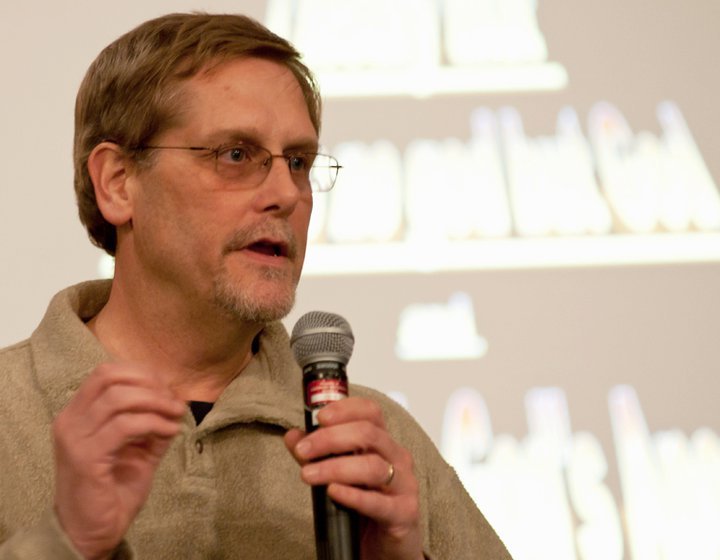“Christian Zionism” and the Myth of Manifest Destiny – John Hubers
America, in part, owes its national identity to the prevalence of powerful myths that arose out of its early history. Many of these myths are attached to founding “fathers”, others to the occupation of the land by European settlers and their experience of nation building.
Perhaps the most powerful myth is that which developed out of the frontier experience of an emerging nation. Manifest destiny is how historians label it, the belief that the settlement and taming of this vast largely uninhabited land by European colonialists was a divinely destined event.
This is the basic outline of the myth: a brave pioneering people, escaping from religious and political oppression and persecution in Europe meet great obstacles in realizing their dream of a free land for free people in an untamed wilderness. Among these obstacles are savage natives who use terrorist tactics to thwart their designs. With God’s help the brave settlers defeat the savages allowing for the cultivation and taming of a land that was largely undeveloped by the more primitive peoples who inhabited it.
This myth was long ago debunked as revisionist scholarship highlighted the brutality of this early form of ethnic cleansing. But the mythic elements of the narrative: heroic pioneers escaping persecution to give birth to “liberty and justice for all” with God’s blessings continue to incubate American self identity.
Knowing this gives insight into the puzzle surrounding the widespread support of American Christians for the state of Israel. It especially helps explain how the eschatology of an obscure 19th century British Christian sect managed to capture the imagination of appreciable numbers of what is the one of the largest and most politically powerful non-Catholic groupings of Christians in America; those who self identify as “evangelicals.” The sect in question was the Plymouth Brethren founded by a former Irish Anglican priest named John Nelson Darby in mid-nineteenth century Britain. His teaching was a foundational element in the development of an eschatologically-driven interpretation of scripture known as “dispensationalism.”
A key aspect of “dispensationalism” is the distinction it makes between Israel and the Church in God’s plan of salvation. It was Darby’s belief that Old Testament prophesies related to the restoration of Diaspora Jews to the pre-exilic land of Israel were to be literally fulfilled as a prelude to the Second Coming. In short, it called for the restoration of the Jews to the land God promised them as an eternal inheritance.
Darby’s teaching became popularized in America at the turn of the century through the preaching of the evangelist DL Moody as well as the publication of the widely read “Scofield Study Bible” which used color coded charts to give credence to dispensationally-inspired interpretations of the prophetic passages of scripture. Later Dallas Theological Seminary would pick up the dispensationalist torch, the most notable of its attendees being Hal Lindsey, the author of the widely read Late Great Planet Earth (the best selling non-fiction book of the 1970s).
In the eyes of dispensationalists the founding of the state of Israel in 1948 was proof that Darby got it right. This was given more credence by the Zionist state’s swift and decisive victory in the 1967 six-day war. “Clearly God’s hand was in this”, trumpeted the dispensationalists. It was the literal fulfillment of biblical prophesy.
This was the position of a group which even at its peak tended to float at the fundamentalist fringe of American Christianity. But the foundational basis of their teaching related to the founding of the modern state of Israel – that this was God’s doing – had an impact well beyond the imagination of its devotees at least partly because of the merging of the two founding myths; Israel’s and America’s.
What is striking here is the similarity of the two myths. Like the American myth, the Zionist myth portrays the early settlers responding to religious persecution in their homelands with dreams of developing a free state in a largely undeveloped land. One of the impediments to realizing this dream were savages (in this case Palestinian terrorists) who opposed it for no valid reason beyond their naturally savage nature. And then, once the Zionist dream was realized with the creation of the Jewish state, the Zionists, like the American settlers, made the land flourish in a way it hadn’t under the poor stewardship of its previous inhabitants. Clearly it was, as the dispensationalists are quick to point out, God who made this happen.
Here, I believe, is at least one explanation for the otherwise inexplicable influence of the dispensationalist narrative of a divinely sanctioned Israel on the American consciousness. It resonates with the American myth of manifest destiny. Their story is our story. And in both cases God is on our side.
It is telling that the tenacious hold of this myth on American consciousness is fading just as the myth of manifest destiny has faded. The core injustice of both has led thoughtful Christians, particularly of the current generation, to question the moral legitimacy of the occupation. That this is happening among younger evangelicals who in previous generations might have been swayed by the dispensationalist interpretation of scripture, is a sign that the tide may be turning. Evidence of this will be explored in posts to follow this one. For now it is important to note how the two myths have fed each other making it difficult for those who are committed to promoting a more balanced approach to the Israeli-Palestinian conflict to make their case.
The Rev. Dr. John M. Hubers is assistant professor of missiology at Northwestern College in Orange City, Iowa. From 2001-2006 he held the Middle East and South Asia desk for the Reformed Church in America. He earned his BA in History from the institution where he is currently teaching, his MDiv from New Brunswick Theological Seminary (NJ) and his ThM and PhD from the Lutheran School of Theology at Chicago. During his seminary training, Rev. Hubers spent one year in Cairo, Egypt studying Arabic and Christian/Muslim relations. From 1986-96 Dr. Hubers served as pastor of international congregations in the Arabian Gulf States of Oman and Bahrain, where he had also taught English for two years after graduating from university. He has also served churches in New York, Michigan and Texas. Dr. Hubers is the author of a number of articles relating to Christian-Muslim relations in the Church Herald, the former denominational magazine of the Reformed Church in America, along with several articles in The Other Side magazine on topics relating to Islam, the first Gulf War, and Christian/Muslim relations in Egypt. “Zion’s Christian Soldiers” is Rev. Hubers’ critique of Christian Zionism (a study guide for Reformed Church congregations), and “Christian Zionism and the Myth of America” is the text of an address he gave to the Middle East Council of Churches conference in Beirut, Lebanon (2002). Both papers are available at HCEF’s website. Dr. Hubers and his wife Lynne have two grown children.



Thanks for this excellent post. I will look forward to the rest of the series. Another common thread is the myth of “desolate” lands that are sitting in darkness, waiting for to be brought into “the light.” I have been reading John Judis’ new book, Genesis: Truman, American Jews, and the Origins of the Arab/Israeli Conflict. I was glad to see Judis go back to Cotton Mather: “In 1702, the Puritan Cotton Mather described the migration into New England as ‘some thousands of Reformers [sailing] into the Retirements of an American Desert.’ The English saw Africa and the West Indies as “barren” and therefore open to Western exploitation.” AMERICAN DESSERT! Judis also speaks of Russian Zionist Moshe Lilienblum, “who had never set eyes on Palestine, assumed that if the Jews were to reclaim Palestine, they would discover a ‘desolate’ land…” Judis says, “This kind of thinking was common among Europeans who set out to colonize lands where the inhabitants were not Christian and at a lower level of economic development.” As a Middle Eastern Christian, (non-Western) I find that native peoples are still invisible to so many in the West where a peoples’ or a cultures’ worth is determined relative to the West. I find this mentality and attitude incredibly arrogant and elitist and not helpful in the pursuit of peace and justice.
Thanks for your kind response. And even more – thanks for alerting me to this book by John Judis. I wasn’t aware of it, but it sounds like a great read with great insights into the parallels between the pioneering Zionists and early American settlers. It has often struck me that the Zionist movement happened at the wrong historical moment as Israel was created just as the colonial project was being dismantled everywhere else. I understand that Israelis and Jews in general chafe at any comparison between Zionism and colonialism, but its difficult not to see the linkage.
Pingback: HOW U2’S 2017 JOSHUA TREE TOUR ACCLIMATES AMERICAN THEOCRATIC FASCISM | Wrong Kind of Green